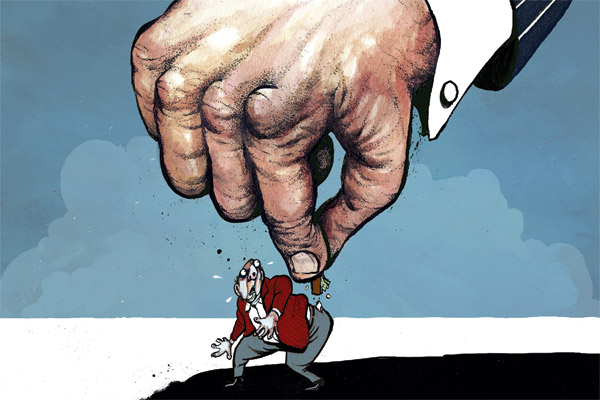Ed Miliband’s manifesto can be boiled down to the simple act of shaking his fist at the wealthy. Yes, the super-rich can be annoying – but they are also super-taxpayers. Those at the top should shoulder their fair share, Miliband said today. But he didn’t give any figures: if he did, his argument would collapse. The best-paid 1 per cent pay 25 per cent of the income tax: that’s what I call a fair share. And for those who are serious about fairness, it’s a sign that our society has got something right. The super-wealthy are also super-taxpayers. The best-paid 0.1 per cent pay almost twice as much income tax as the lower-paid 50 per cent. So wealthy already pay their fair share: it’s now time to stop calling them names and leave them alone.
This is a rather unpopular argument, I admit, and one I’ll be debating next week with Owen Jones, amongst others (see below). I can already imagine what he’s going to argue: inequality is getting worse, we have to do something. But Cameron has squeezed the rich more effectively than any Prime Minister in recent history. How? He cut their taxes. Here’s what happened:-

The above graph should warm the heart of the most ardent redistributist – if they were interested in facts, rather than getting angry for the sake of it. Never in this nation’s recorded history have those at the top shouldered a greater income tax burden than they do now.
Nor is this a first time a Tory Chancellor has squeezed the rich far more than Labour was able to. A few years back, I asked HMRC to trawl its databanks for earlier ratios before Nigel Lawson’s 1988 budget which reduced the top rate from 60 per cent to 40 per cent and had hotheads like Alex Salmond storming out of the chamber in protest.
It asks what share of income tax was paid by the top X per cent Here’s what the results showed:-

Note the jump after 1987. This is why Nigel Lawson should be regarded as the most distributive Chancellor in British history. When he reduced the top rate to 40% he unleashed wealth creation and the government profited by taking a smaller slice of a much bigger pie.
And this is why the system the  Tories bequeathed to Labour in 1997 was more ‘progressive’ than what they inherited from Callaghan and Healey. Nigel Lawson and George Osborne have both demonstrated the lesson JFK taught the world in 1960 and the Irish taught us with corporation tax: lower tax rates mean higher tax yields.
Tories bequeathed to Labour in 1997 was more ‘progressive’ than what they inherited from Callaghan and Healey. Nigel Lawson and George Osborne have both demonstrated the lesson JFK taught the world in 1960 and the Irish taught us with corporation tax: lower tax rates mean higher tax yields.
I look forward to hearing what Owen Jones and the noted chef Jack Monroe have to say about this in our debate on Wednesday next week: there are still a few tickets left, so join us if you can.








Comments